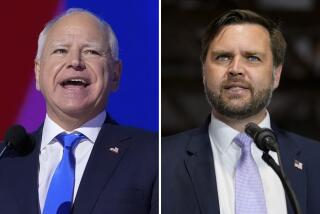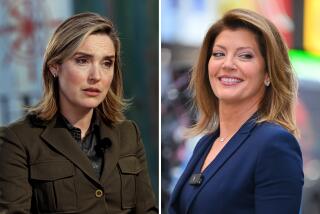Who’d win in a one-man debate?
- Share via
Less than 24 hours before they were to share a stage, John McCain and Barack Obama remained at odds over tonight’s first presidential debate, with Obama planning to proceed and McCain holding out for a congressional rescue of the nation’s teetering financial system.
After showing up for a White House meeting on the administration’s troubled bailout proposal -- and sitting at opposite ends of a large oval table -- the candidates appeared no closer to breaking their impasse.
On Thursday night, Obama urged McCain to join him at the University of Mississippi.
“Sen. McCain has no reason to be fearful about a debate,” the Democrat told reporters in Washington. “He’s got his personal, strong opinions, and you know he’s been expressing them on the campaign trail. This does give us an opportunity to go back and forth.”
Aides to McCain, the Republican senator from Arizona, reiterated his intention to stay in Washington until a legislative agreement is reached, even if it means skipping tonight’s session, the first of three debates planned between now and mid-October.
“With so much on the line, for America and the world, the debate that matters most right now is taking place in the United States Capitol, and I intend to join it,” McCain told a New York audience before flying to Washington to join the bailout talks.
University officials, the major television networks and the nonpartisan commission sponsoring tonight’s debate all indicated they would proceed on the assumption McCain would show up in the end. But the prospect he might skip the debate -- which would be unprecedented -- only elevated the political stakes.
“I could see it cutting either way,” said John J. Pitney, Jr., a government professor at Claremont McKenna College. “Obama could cast this as McCain’s effort to duck debates, and McCain could cast it as Obama putting political interests ahead of national interests. Since this is totally uncharted waters, I don’t know whose interpretation is going to win.”
With the race so close, the presidential debates could prove pivotal.
“It’s a critically important moment in the campaign for both candidates,” said Paul Maslin, a Democratic strategist who is not affiliated with the Obama campaign. “There’s a large number of people who probably stayed away from the two conventions and ignored most of the ads and the noise on cable television who will tune in to watch these debates.”
Tonight’s assigned topic is national security and foreign policy, but the candidates would be free to discuss whatever they choose, using questions from the moderator, PBS’ Jim Lehrer, as a starting point.
Obama told NBC’s “Nightly News” that he planned to talk about the economy. “With this looming on the horizon, this has an effect all across the globe,” the Illinois senator said. “We can’t be strong abroad if we’re not strong at home.”
The audience for tonight’s debate, if held, would likely be huge, perhaps rivaling the record 80.6 million Americans who watched the 1980 debate between Ronald Reagan and President Carter. Then, as now, the nation was facing a slumping economy and troubles abroad. The political dynamic was also similar, with a candidate fresh to the national scene -- and a bit frightening to some -- having to prove his trustworthiness against a more familiar figure.
Although presidential debates of the last 40 years have produced some memorable moments -- Michael Dukakis fumbling a question on the death penalty, George H.W. Bush stealing a glance at his watch, Al Gore audibly sighing -- they have rarely decided the outcome of an election. That could change this year, analysts say.
“The country’s at war. Current events are hitting home as people go to the store, go to the filling station,” said Robert Friedenberg, a presidential debate expert at Miami University in Ohio. “Couple that with the fact it appears we’re going to have a close election, and it seems these debates will have more impact than normal.”
The two candidates, who participated in numerous primary debates, would come to the Ole Miss campus with quite different styles.
Obama, who once taught constitutional law, tends toward long, annotated answers and shrinks from verbal combat. His laid-back manner can seem aloof and, at times, condescending. McCain is blunt and relishes the cut and thrust of political battle, though his pugnacity can make him seem short-tempered and angry.
“I would define Obama as cool . . . and McCain as hot,” said Tom McPhail, a professor of media studies at the University of Missouri-St. Louis. “So the contrast should be extremely interesting.”
The two also have different political goals.
Obama has soared on the flight of his high-toned rhetoric, and polls show him gaining traction in the last week as the economy becomes all-consuming in the minds of many voters. Still, there are doubts about what, precisely, Obama means when he promises change.
“He’s shown he can give a big speech in front of 70,000 people,” Maslin said of Obama’s triumphant address at last month’s Democratic convention. “Now he needs to get down and dirty in a way people can understand. He has to connect with people, get into their kitchens and their living rooms and convince them he will really make the difference he’s talking about.”
McCain pulled even or slightly ahead in opinion polls after the GOP convention and the selection of running mate Sarah Palin, the governor of Alaska.
But his momentum has stalled after a shaky response to the meltdown on Wall Street.
“For McCain, [the debate] is an opportunity to reverse that and regain the initiative, which he needs to do,” said David Winston, a Republican pollster. “People want to know how his experience would translate in terms of what his governing and policies would look like.”
Polls show a great deal of uncertainty among voters, further elevating the importance of the debates. Nearly 1 in 3 of those interviewed in the latest Los Angeles Times/Bloomberg poll said they could change their preference based on what they saw and heard in the debates.
After tonight, McCain and Obama are set to meet Oct. 7 in Nashville and Oct. 15 on Long Island, N.Y.
Their running mates, Delaware Sen. Joe Biden and Palin, are scheduled to debate Thursday in St. Louis.
--
--
(BEGIN TEXT OF INFOBOX)
Many channels for coverage
Assuming it goes ahead as planned, tonight’s debate between presidential hopefuls John McCain and Barack Obama at the University of Mississippi is expected to be a major television event. Most broadcast networks will be carrying the debate live, as will several cable channels. The 90-minute forum, moderated by PBS’ Jim Lehrer, begins at 6 p.m.
Broadcast networks
ABC: Charles Gibson, Diane Sawyer and George Stephanopoulos anchor coverage from New York from 6 to 8 p.m. A special “20/20” about the candidates will air at 10 p.m.
CBS: Katie Couric leads the network’s on-air coverage from Oxford, Miss., from 6 to 8 p.m., followed by a 30-minute live webcast on CBSNews.com with interviews and analysis.
Fox: Shepard Smith, on loan from Fox News Channel, anchors coverage from 6 to 7:30 p.m.
NBC: Anchor Brian Williams oversees coverage from Oxford from 6 to 8 p.m.
PBS: With Lehrer serving as moderator, Ray Suarez anchors coverage from 6 to 8 p.m., with contributions from NPR campaign reporters.
--
Cable networks
BBC America: Washington correspondent Katty Kay anchors coverage from Oxford from 6 to 8 p.m.
CNN: Coverage begins at 1 p.m. with a special edition of “The Situation Room,” followed by reporting led by anchors Wolf Blitzer, Campbell Brown and Anderson Cooper until 9 p.m.
Current TV: The network will display real-time Twitter messages from viewers on-screen throughout the debate, beginning at 5:45 p.m.
Fox News: Pre-debate analysis kicks off at 2 p.m. with a special edition of “America’s Election HQ.” Brit Hume anchors coverage of the debate until 8:15 p.m., followed by special editions of “Hannity & Colmes” and “On the Record.”
MSNBC: David Gregory anchors live coverage and analysis from 6 to 8 p.m., followed by special editions of “Countdown With Keith Olbermann,” “Hardball With Chris Matthews” and “The Rachel Maddow Show.”
--
Source: Times research
More to Read
Get the L.A. Times Politics newsletter
Deeply reported insights into legislation, politics and policy from Sacramento, Washington and beyond. In your inbox twice per week.
You may occasionally receive promotional content from the Los Angeles Times.









